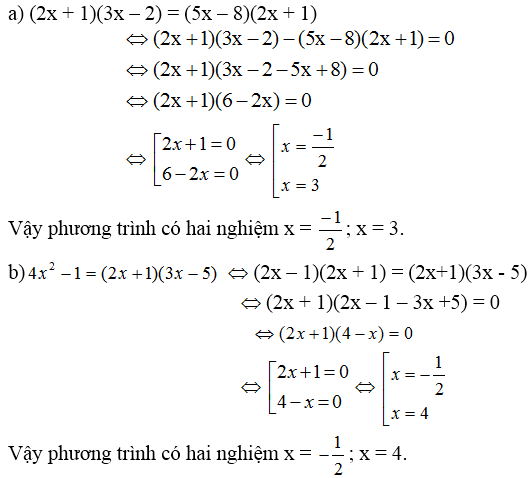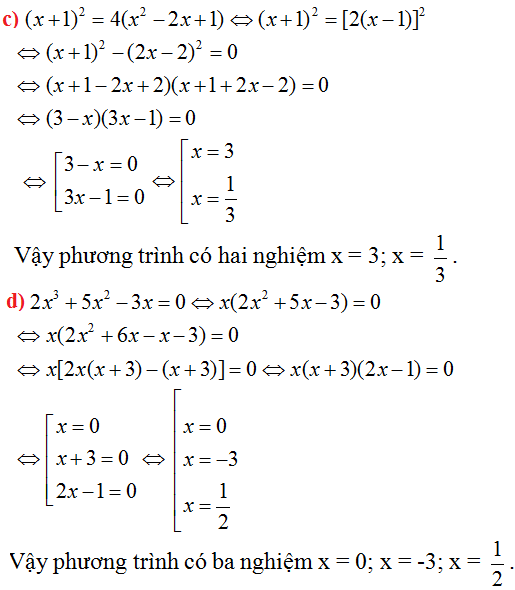Hãy nhập câu hỏi của bạn vào đây, nếu là tài khoản VIP, bạn sẽ được ưu tiên trả lời.

a)(2x+1)(3x-2)=(5x-8)(2x+1)
⇔(2x+1)(3x-2)-(5x-8)(2x+1)=0
⇔(2x+1)(3x-2-5x+8)=0
⇔(2x+1)(-2x+6)=0
⇔2x+1=0 hoặc -2x+6=0
1.2x+1=0⇔2x=-1⇔x=-1/2
2.-2x+6=0⇔-2x=-6⇔x=3
phương trình có 2 nghiệm x=-1/2 và x=3

a) \(9x^2-1=\left(3x+1\right)\left(2x-1\right)\)
\(\Rightarrow\left(3x+1\right)\left(3x-1\right)=\left(3x+1\right)\left(2x-1\right)\)
\(\Leftrightarrow\left(3x+1\right)\left(3x-1\right)-\left(3x+1\right)\left(2x-1\right)=0\)
\(\Leftrightarrow\left(3x+1\right)\left(3x-1-2x+1\right)=0\)
\(\Leftrightarrow x\left(3x+1\right)=0\)
\(\Leftrightarrow\orbr{\begin{cases}x=0\\3x+1=0\end{cases}}\Leftrightarrow\orbr{\begin{cases}x=0\\x=\frac{-1}{3}\end{cases}}\)
b) \(\left(4x-3\right)^2=4\left(x^2-2x+1\right)\)
\(\Leftrightarrow16x^2-24x+9=4x^2-8x+4\)
\(\Leftrightarrow12x^2-16x+5=0\)
Ta có \(\Delta=16^2-4.12.5=16,\sqrt{\Delta}=4\)
\(\Rightarrow\orbr{\begin{cases}x=\frac{16+4}{12}=\frac{5}{3}\\x=\frac{16-4}{12}=1\end{cases}}\)

\(a,2x\left(x-5\right)+4\left(x-5\right)=0\\ \Leftrightarrow\left(x-5\right)\left(2x+4\right)=0\\ \Leftrightarrow\left[{}\begin{matrix}x-5=0\\2x+4=0\end{matrix}\right.\\ \Leftrightarrow\left[{}\begin{matrix}x=5\\2x=-4\end{matrix}\right.\\ \Leftrightarrow\left[{}\begin{matrix}x=5\\x=-2\end{matrix}\right.\)
Vậy \(x\in\left\{5;-2\right\}\)
\(b,3x-15=2x\left(x-5\right)\\ \Leftrightarrow3\left(x-5\right)-2x\left(x-5\right)=0\\ \Leftrightarrow\left(x-5\right)\left(-2x+3\right)=0\\ \Leftrightarrow\left[{}\begin{matrix}x-5=0\\-2x+3=0\end{matrix}\right.\\ \Leftrightarrow\left[{}\begin{matrix}x=5\\2x=3\end{matrix}\right.\\ \Leftrightarrow\left[{}\begin{matrix}x=5\\x=\dfrac{3}{2}\end{matrix}\right.\)
Vậy \(x\in\left\{5;\dfrac{3}{2}\right\}\)
\(c,\left(2x+1\right)\left(3x-2\right)=\left(5x-8\right)\left(2x+1\right)\\ \Leftrightarrow\left(2x+1\right)\left(3x-2\right)-\left(5x-8\right)\left(2x+1\right)=0\\ \Leftrightarrow\left(2x+1\right)\left(3x-2-5x+8\right)=0\\ \Leftrightarrow\left(2x+1\right)\left(-2x+6\right)=0\\ \Leftrightarrow\left[{}\begin{matrix}2x+1=0\\-2x+6=0\end{matrix}\right.\\ \Leftrightarrow\left[{}\begin{matrix}2x=-1\\2x=6\end{matrix}\right.\\ \Leftrightarrow\left[{}\begin{matrix}x=-\dfrac{1}{2}\\x=3\end{matrix}\right.\)
Vậy \(x\in\left\{-\dfrac{1}{2};3\right\}\)
Câu d xem lại đề

a) 7x - 35 = 0
<=> 7x = 0 + 35
<=> 7x = 35
<=> x = 5
b) 4x - x - 18 = 0
<=> 3x - 18 = 0
<=> 3x = 0 + 18
<=> 3x = 18
<=> x = 5
c) x - 6 = 8 - x
<=> x - 6 + x = 8
<=> 2x - 6 = 8
<=> 2x = 8 + 6
<=> 2x = 14
<=> x = 7
d) 48 - 5x = 39 - 2x
<=> 48 - 5x + 2x = 39
<=> 48 - 3x = 39
<=> -3x = 39 - 48
<=> -3x = -9
<=> x = 3

a, \(1-\frac{2x-1}{9}=3-\frac{3x-3}{12}\)
\(\Leftrightarrow\frac{108-12\cdot\left(2x-1\right)}{108}=\frac{108\cdot3-9\cdot\left(3x-3\right)}{108}\)
\(\Rightarrow108-12\cdot\left(x-1\right)=108\cdot3-9\cdot\left(3x-3\right)\)
\(\Leftrightarrow108-24x+12=324-27x+27\)
\(\Leftrightarrow3x=231\)
\(\Rightarrow x=77\)
c,\(\frac{3}{4x-20}+\frac{15}{50-2x^2}+\frac{7}{6x+30}=0\)
\(\Rightarrow3\cdot\left(50-2x^2\right)\cdot\left(6x+30\right)+15\cdot\left(4x-20\right)\cdot\left(6x+30\right)+7\cdot\left(4x-20\right)\cdot\left(50-2x^2\right)=0\)
\(\Leftrightarrow900x+4500-36x^3-180x^2+360x^2+1800x-1800x-9000+1400x-56x^3-7000+280x^2=0\)
\(\Leftrightarrow-92x^3+460x^2+2300x-11500=0\)
\(\Leftrightarrow92x^3-460x^2-2300x+11500=0\)
\(\Leftrightarrow\orbr{\begin{cases}x=-5\\x=5\end{cases}}\)
a) Thay x = 3 vào bất phương trình ta được: 2.3 + 3 < 9 <=> 9 < 9 (khẳng định sai)
Vậy x = 3 không là nghiệm của bất phương trình2x + 3 < 9
b) Thay x = 3 vào bất phương trình ta có: -4.3 > 2.3 + 5 => -12 > 11 (khẳng định sai)
Vậy x = 3 không là nghiệm của bất phương trình -4x > 2x + 5
c) Thay x = 3 vào bất phương trình ta có: 5 - 3 > 3.3 -12 => 2 > -3 (khẳng định đúng)
Vậy x = 3 là nghiệm của bất phương trình 5 - x > 3x - 12




(2x + 1)(3x – 2) = (5x – 8)(2x + 1)
⇔ (2x + 1)(3x – 2) – (5x – 8)(2x + 1) = 0
⇔ (2x + 1).[(3x – 2) – (5x – 8)] = 0
⇔ (2x + 1).(3x – 2 – 5x + 8) = 0
⇔ (2x + 1)(6 – 2x) = 0
⇔ 2x + 1 = 0 hoặc 6 – 2x = 0
+ 2x + 1 = 0 ⇔ 2x = -1 ⇔ x = -1/2.
+ 6 – 2x = 0 ⇔ 6 = 2x ⇔ x = 3.
Vậy phương trình có tập nghiệm